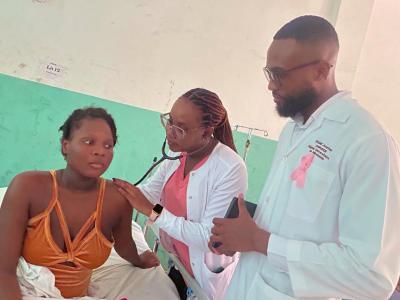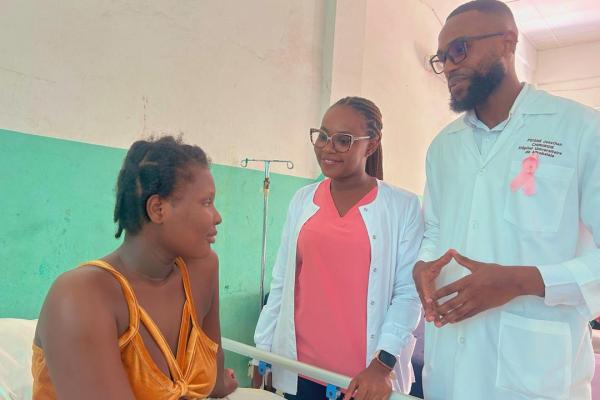At just 23 years old, mother of a young child and originally from Port-au-Prince, Katiana’s life was turned upside down in a matter of weeks. She began to experience severe shortness of breath accompanied by heart pain and intense fatigue. Her condition rapidly deteriorated, and she could no longer perform simple everyday gestures.
Determined to find help, Katiana left Port-au-Prince. She crossed the Artibonite, faced roads in very poor condition, uncertain transport and an area marked by growing insecurity, to reach Sainte-Thérèse Hospital in Hinche, where she was finally admitted in an emergency. The journey, which should have been difficult in the right circumstances, was made even more so by the armed groups and crises that make access to healthcare particularly precarious in Haiti.
The diagnosis made by the medical team revealed severe cardiac and respiratory decompensation. She had dyspnea on exertion, evolving into dyspnea at rest with orthopnea, meaning that Katiana’s heart and lungs were no longer functioning properly. She found it increasingly difficult to breathe, first when walking, then even when resting or lying down. She was hospitalized for 13 days, where she received intensive care, constant monitoring and support from the internal medicine department. Thanks to the availability of medication and the commitment of the staff, her condition improved markedly.

Today, Katiana is breathing better, regaining her energy and holding out hope of resuming a normal life with her child.
“Mwen te rive lopital la nan move eta, men jodi a m santi kò m chanje. Mèsi anpil pou swen yo ban mwen.”
In Haiti, cardiovascular disease is on the rise. Between 2019 and 2022, the incidence of cardiovascular events rose from 6,268 to 11,363, an increase of around 81%. It is also estimated that over 32% of all deaths in the country are due to cardiovascular disease. ( One study of young adults (aged 18-30) showed that 23.5% had hypertension, 34.9% dyslipidemia - an abnormally high or decreased concentration of lipids in the blood), major risk factors for conditions like Katiana’s.)
Alongside these health challenges, access to healthcare remains made extremely difficult by deteriorating security. The transport situation, the poor state of the roads, and the remoteness of specialized centers aggravate the situation, all the more so for a young mother leaving the capital to reach a care facility in a rural area.
In this context, the journey from Katiana to Hinche is as much a matter of courage as of necessity. Whether it’s crossing high-risk areas, finding reliable transportation, or accessing specialized care: it all poses a challenge.
Zanmi Lasante’s role is visible in this journey: ensuring that even remote or vulnerable people can receive quality care. The commitment of the staff, the availability of medicines, and the human accompaniment enabled Katiana to literally get her breath back. It’s a life saved and a concrete testimony to what access to care can mean.
Behind this success lie challenges: the increase in cardiovascular disease, the remoteness of care, the fragility of access in a context of insecurity. Your support enables Zanmi Lasante to maintain its services, ensure the availability of medicines, strengthen teams, and above all respond to emergencies like the one in Katiana. Make a donation today.
